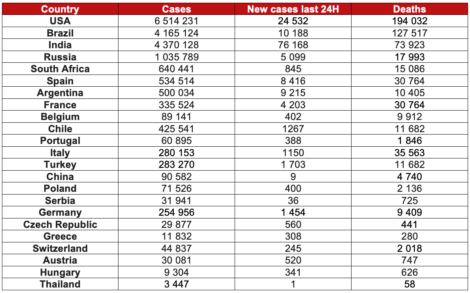TODAY’S UPDATED GENERALI GLOBAL ASSISTANCE/EUROP ASSISTANCE MEDICAL INFORMATION AND ACTION RECOMMENDATIONS REGARDING THE COVID-19 PANDEMIC
9 September 2020SEPTEMBER 9TH 2020, H00 Paris time – Dr M. Kalina, EA Group Medical Director, F. Tits, RN, EA Group Sr Project Manager, and Chiara Jannuzzi, EA Group Communication team.
Sources: International sources such as WHO, Chinese CDC, CDC, international media, medical institutions, journals and government websites.
Current key news, facts and data
The pandemic is still extremely active, especially in the Americas and in India, which still account for over 50 % of the overall total cases and daily new cases, although the latter are starting to decrease a bit. Three countries, the USA, Brazil and India continue to account for over half of the worldwide cases, including new cases, most of the latter being from India. Africa is still under threat and has now more than a million cases, 1 092 149 by yesterday, more than half from South Africa. In the countries were deconfinement has started, especially in Europe, some rises in the infection rate and hospital and ICU have been noticed. Regional actions such as restrictions on certain activities and compulsory mask wearing as well as limitations to border crossings or imposition of quarantines have been enacted again.
The total worldwide cases as of 2 PM Beijing time, September 9th, is 27,743,135 cases, with 901,928 deaths.
The main figures in the countries where Generali Global Assistance/Europ Assistance has offices are as follows:

There are still no breakthroughs in terms of treatment modalities, as aside from hydrocortisone in the intensive care phase of the disease, no drug has proven effective in reducing the impact of the disease or the transmission of the virus.
VACCINE – At this stage GAVI, the Global Alliance for Vaccines and Immunizations, supports an initiative by 172 countries to develop and distribute formally supported vaccines plus another 9 candidates. Hopefully the first vaccine could be available very late 2020 or early 2021. The production capacity required to cover the whole world will be extremely high. The competition to rapidly secure a supply is already on, but we need still need to see how it goes. For instance, the Astra Seneca / Oxford University project had to suspend its project because of a serious adverse effect event.
Key recommended actions items
At the current stage, social distancing remains the most important tool. Avoiding close personal contacts except with non-fragile members of one’s own household is the key. Therefore, work environments must be adapted as must shops, public facilities and transport systems. The avoidance of any public or private event producing a crowd or close physical contacts is part of this action item.
A necessary addition to this component of the strategy is the obligation from anyone with the symptoms or close contacts with detected case to isolate him/herself, seek medical attention and get tested if indicated. To this the active use of regular cleaning with either soap and water or hydroalcoholic gel must be added. The proper use of masks is a recognized must in all closed and / or crowded environments.
Travel is acceptable where allowed in as much as the above are respected, and temperature control can be added as a means of detecting part of the potential carriers.
Maximizing access to testing is important not only to increase the systematic testing around clusters but also testing prior to some trips and of course any test required by a physician.
In his August 31st speech, the Director general of the WHO, Dr Tedros Adhanom Ghebreyesus, argued in favor of focusing on four priorities:
- The prevention of amplifying events
- The protection of vulnerable groups
- Steps by individuals to protect themselves and others
- Isolate, test and care for cases and trace and quarantine contacts.
COVID CASE AIR AMBULANCE TRANSPORTATION
Quite a few patients with COVID, especially those in countries where it is difficult to provide high end care to critical cases, but not only, repatriations have taken place. This requires a fairly challenging authorization process both in the country of origin and at the country of destination (by far the best is to send people to their home country). Several providers in Europe, Africa and the Americas provide this service.


